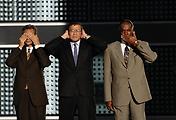The business and management field is too important to be taken solely by business experts such as MBAs. We need multiple perspectives and multiple paradigms to address current business and management problems. Learning, teaching, education, and human development perspectives are essential fields of scholarship that provide more human centered values to business and management.
- Dr. K. Peter Kuchinke (Collaborative Seminar Serieces at UIUC, Sept. 18, 2012)
Dr. K. Peter Kuchinke's Lecture: But is it Education? Situating Training and Development in the Canon of Education Research and Practice.
Series: UIUC Higher Education Collaborative Seminar Series
Place: EDU 242, University of Illinois at Urbana-Champaign.
Opportunity of Merging EPOL department:
1. New conversations among three departments of Educational Policy, Education Organizational Leadership, and Human Resource Development.
2. Learning and development for Economic Discourse for the U.S. and developing countries.
3. Stretching of educator's role.
... But is it education?
Contesting HRD.
Debate: What is the role of educators in business settings?
Meaning of work: Individual well-being: Human development paradigm: Connection with Education & Labor e.g. AOMLE
Summary of the Seminar:
1. Teaching/Learning/Development in work contexts as ubiquitous educational practice
2. Wide range of educational provisions and approaches.
3. Extensive area of professional commitment by educators.
4. Shares with school-based education core challenges, concerns, and processes.
5. Focus on practice (practical purposes).
6. Subject to institutional constrains and opportunities (over emphasis on organizational goal, underestimate personal development).
Contours of 'HRD'
- Academia:
1) Growth of professional fiels in knowledge based societies (Academic Profession, Clark, 1986)
2) Limits to growth: Hard to have "distinctiveness, legitimacy, mobilization, and resource".
3) Three pathways of HRD in the US [Demands from Government(Georgia Univ.), Academic programs (vocational Ed.: Minnesota Univ.), and business].
4) HRD Domains: T&D, C&D, OD, Workforce/Technical education, Adult education, Professional/continuing education/ Instructional technology.
5) HRD professional demand (Bureau of Labor Statistics, 2012): TD experts (15%), HR experts (22%), Management experts (21%). Independent consultant (?).
6) Trends: Moving learning function to line supervisors and managers.
- Practice:
1) Investing employees (ASTD, 2010), $ 220 bil.
2) HRD professionals - Learning and change experts:
TD, OD, Organizational effectiveness, Organizational learning, Leadership development, Professional education, Quality/process improvement, Talent management, Knowledge management.
3) Formal learning / Informal-incidental learning / Structural initiatives (OD, CD, HPWS).
Debates
- Scope and Boundaries:
1) HRD as "multi-paradigm, multi-disciplinary, open-ended, and complex (Kuchinke, 2007)"
2) Adresses change/development at 'multiple levels operates within competing goals/objecties/needs"
3) HRD Scholarship
- Martin Maurer: Dialogue in healthcare process improvement teams
- Rosa Muraguri-Mwolo: Performance management in UN reforestation program.
- Sujin Son: Mentoring in Korean corporations
- Torrence sparkman: Leadership development in an African American Church
- Kevin Gitonga: College to career transition in Kenya
- Goals & Objectives:
1) Learning as means to end: Effectiveness; efficiency; customer service, employer of choice, capacity building.
2) Balance the demand from organization and employee.
3) Student motivation: 'people orientation and social value development through learning and development'
- Adequacy and Effectiveness:
1) Transfer of training problem - Lack of evidences
2) Dominance of classroom format
3) Low integration and application of educational research to address 'real problems'.
Connections
- VET/CTE: George Copa - Education for, at about, and through "Work".
- Education in the Professions: Engineering, Medicine etc.
- Education outside of formal employment: Volunteer work, work after retirement, work at public entities.
- Education Policy, Higher Education, History/Philosophy, Curriculum Studies, Teacher preparation, Ed. Tech., Global studies, Special needs, Access/Equity/Diversity:
'Essay of Leadership > Theory' 카테고리의 다른 글
| Why Chinese and Japanese are different from other Asians? (0) | 2012.11.07 |
|---|---|
| Why do people resist a New HR Practice for the change? (2) | 2012.11.07 |
| Dr. Peter Northouse's Leadership Lecture at UIUC (0) | 2012.09.27 |




댓글